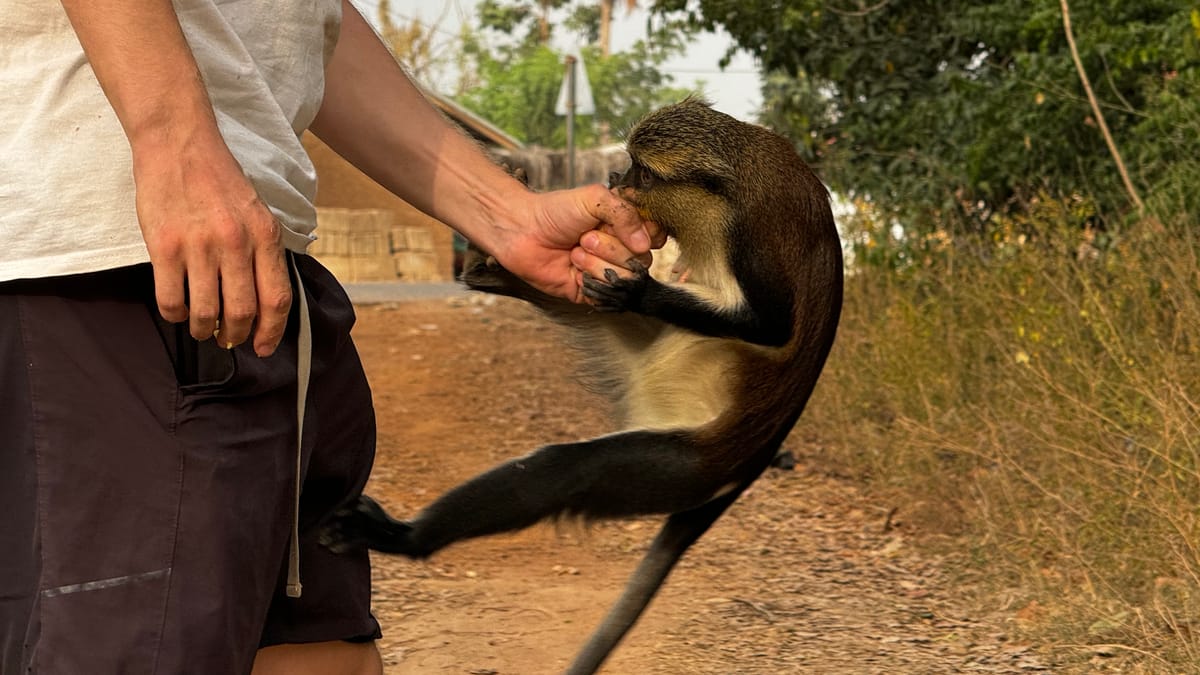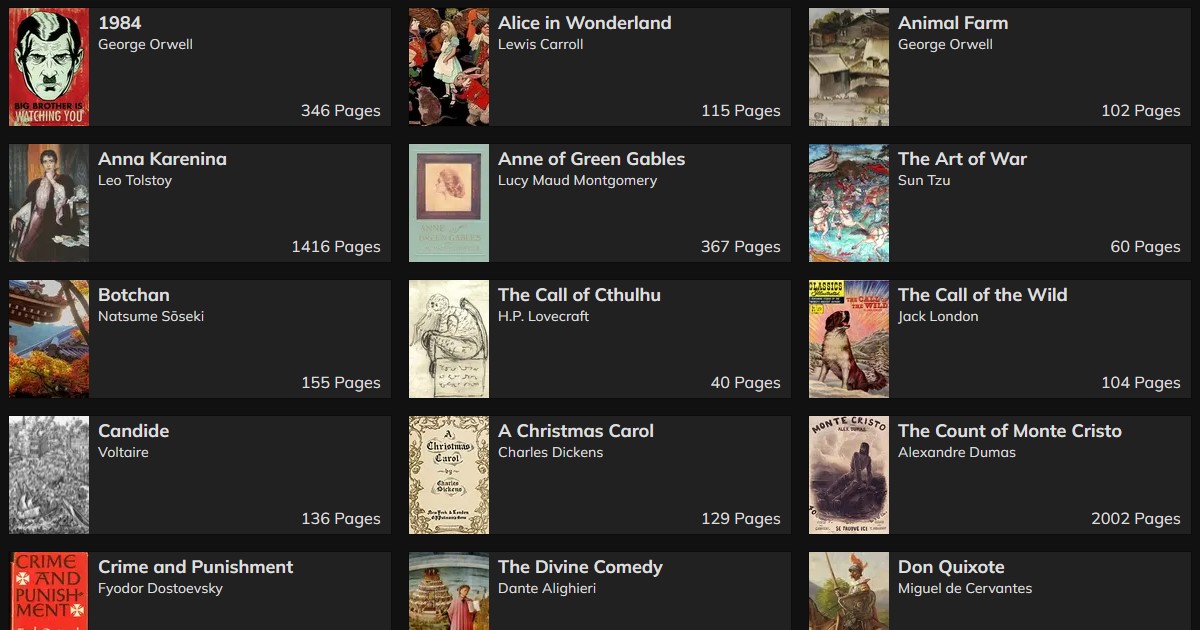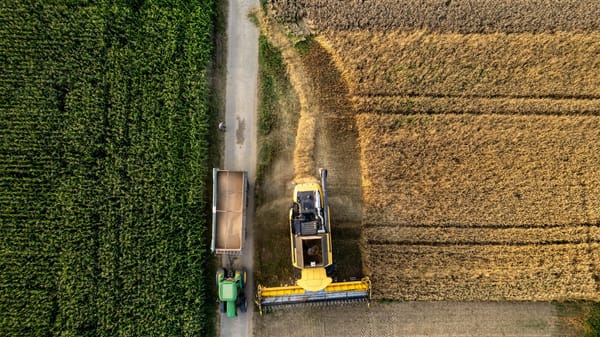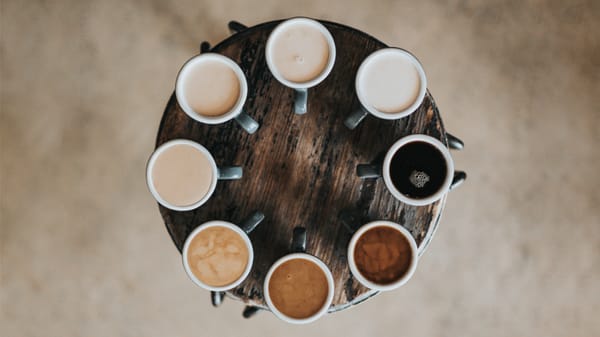Always Bring Banana
Friendship is an often romanticized societal construct. Let’s take a peek behind the curtain and reflect on its underlying mechanics. This week’s issue is about perspective, fast food, and typewriting.

I visited a monkey sanctuary, a fenceless habitat safeguarding wild troops of Mona monkeys—mainly from the risk of being killed by humans.
This sanctuary, self-funded primarily through guided tours, offers an immersive experience with these creatures in their natural forest environment, free from enclosures and training. Again, no fences, no leashes, no jumping through hoops—just a few acres of forest where the monkeys feel comfortable mating, sunbathing on high tree branches, chasing and screaming at each other, and scratching their butts.
Before we entered the sanctuary we were advised to buy some bananas from one of the local food vendors. Sylvester, the guide, gave us a concise briefing:
Don’t worry about them taking your phone, your glasses, or anything. They only want the bananas. When you have bananas they are your best friends. But when the bananas finish the friendship ends.
Indeed, after about half an hour's hike to make our presence known to the forest’s inhabitants, we became the center of attention. The bananas attracted the monkeys to come down from their high branches, chase us, and take from us what they were after in a quite relentless and violent fashion. Once all the fruity assets were securely captured and munched away, the monkeys’ interest vanished in an instant. The bananas were simply both medium and reason for the interaction with them.
Mona monkeys (Cercopithecus mona) and Homo sapiens (humans) both belong to the primate order, but they are classified into different families. Humans are part of the family Hominidae, which includes the great apes and their ancestors, while Mona monkeys are part of the Cercopithecidae family, also known as the Old World monkeys. Biologically, the last common ancestor of all monkeys and apes, including humans, is thought to have lived about 25 to 30 million years ago. Nevertheless, Mona monkeys have been perfecting their own intricate social networks, vocal chit-chat, and mastering the art of resource sharing and stealing—quite similar to humans, just without the need for social media.
Although we humans are not as close to mona monkeys as to chimpanzees for example, many of our social patterns and behaviors are strikingly similar, reminding us that the apple doesn't fall far from the ancestral tree.
It should come as no surprise that the quality of many of our human interpersonal activities and the benefits we gain from them are directly related to our bananas—the bigger the better.
We’re instinctively drawn to people who possess qualities or resources we desire for ourselves. Near irresistible become these things if they appear to be unconditional, accessible without the need for reciprocation, or just require feigned affinity.
This dynamic isn’t a moral issue. It rather presents a fundamental inquiry into individual readiness to acknowledge inherent human behavioral patterns. Are we mature enough to come to terms with our human condition?
What remains is the essential contemplation about what our personal criteria for friendship are. What’s our friendship worth, which value do we assign to these relationships, and does our pursuit of friendship aim at consumption or creation?
Next time you find yourself in a situation of sadness for not being liked just for who you are, rather think of what you could possibly bring to the table. There are many different kinds of bananas. It can be something to consume, yes, such as chocolate or an invitation for a skiing trip with friends. It can be something of creational quality, such as chanting, painting, or storytelling. It can be immaterial, such as a listening ear or heartfelt advice. It can be energetic, such as an inspiring mindset or a burst of positivity.
Whenever you’re about to step into any social scene where the goal is to connect with people, a house cooking party, a family gathering, or the formal vibes of a business meeting, don’t forget your secret ingredient to peel away barriers and sweeten the interactions.
Always bring banana.
Have a phenomenal week!
⏤Ferdinand
✨ Sparks
📝 Article: The Egg
Lovely little story about the meaning of life. If we see ourselves within everybody else it’s much easier to be kind and mature to a more compassionate and integrated part of society.
“The meaning of life, the reason I made this whole universe, is for you to mature.”
“You mean mankind? You want us to mature?”
“No, just you. I made this whole universe for you. With each new life you grow and mature and become a larger and greater intellect.”

📝 Article: In Praise of Fast Food
This thought-provoking essay about the history of food production challenges the contemporary cry for often so-called “natural” food.
I find that one of the most challenging things to come to terms with in life is that nothing is just black and white. When we learn to like or dislike something we tend to develop a romanticized and pedestalized ideal for one side of the spectrum while simultaneously developing strong aversions towards the opposite, and thus, fall into extremes and radical beliefs and behaviors. When it comes to food, these extremes often manifest in diets such as veganism, rawism, or keto.
While such diets undoubtedly have their raison d’être it’s important to keep our minds open and beware of developing a tunnel vision based on ego investment, too narrow to consider the bigger picture and taking historical or economic factors into account.
That food should be fresh and natural has become an article of faith. It comes as something of a shock to realize that this is a latter-day creed.
For our ancestors, natural was something quite nasty. Natural often tasted bad. Fresh meat was rank and tough, fresh fruits inedibly sour, fresh vegetables bitter. Natural was unreliable. Fresh milk soured; eggs went rotten. Everywhere seasons of plenty were followed by seasons of hunger. Natural was also usually indigestible. Grains, which supplied 50 to 90 percent of the calories in most societies, have to be threshed, ground, and cooked to make them edible.
So to make food tasty, safe, digestible, and healthy, our forebears bred, ground, soaked, leached, curdled, fermented, and cooked naturally occurring plants and animals until they were literally beaten into submission. They created sweet oranges and juicy apples and non-bitter legumes, happily abandoning their more natural but less tasty ancestors. They built granaries, dried their meat and their fruit, salted and smoked their fish, curdled and fermented their dairy products, and cheerfully used additives and preservatives–sugar, salt, oil, vinegar, lye–to make edible foodstuffs.
Eating fresh, natural food was regarded with suspicion verging on horror; only the uncivilized, the poor, and the starving resorted to it.
By the standard measures of health and nutrition–life expectancy and height–our ancestors were far worse off than we are. Much of the blame was due to diet, exacerbated by living conditions and infections that affect the body’s ability to use food. No amount of nostalgia for the pastoral foods of the distant past can wish away the fact that our ancestors lived mean, short lives, constantly afflicted with diseases, many of which can be directly attributed to what they did and did not eat.
“Servitude,” said my mother as she prepared home-cooked breakfast, dinner, and tea for 8 to 10 people 365 days a year. She was right. Churning butter and skinning and cleaning hares, without the option of picking up the phone for a pizza if something goes wrong, is unremitting, unforgiving toil. Perhaps, though, my mother did not realize how much worse her lot might have been. She could at least buy our bread. In Mexico, at the same time, women without servants could expect to spend five hours a day kneeling at the grindstone preparing the dough for the family’s tortillas.
For all, culinary modernism had proved what was wanted: food that was processed, preservable, industrial, novel, and fast, the food of the elite at a price everyone could afford.
Were we able to turn back the clock […] most of us would be toiling all day in the fields or the kitchen; many of us would be starving.

🌐 Website: Typelit
I just stumbled upon this super cool website that allows you to practice typing by retyping entire novels. How cool is that? That means you can now combine your reading and writing practice time. At this point, the collection of books is fairly limited, but what’s available is pretty solid. Titles such as 1984, The Art of War, or Crime and Punishment are timeless classics that should keep you busy for a while.

💡 This Week’s Wisdom
The majority of people who fail to accumulate money sufficient for their needs, are, generally, easily influenced by the “opinions” of others. They permit the newspapers and the “gossiping” neighbors to do their “thinking” for them. “Opinions” are the cheapest commodities on earth. Everyone has a flock of opinions ready to be wished upon anyone who will accept them. If you are influenced by “opinions” when you reach DECISIONS, you will not succeed in any undertaking, much less in that of transmuting YOUR OWN DESIRE into money.
From Think And Grow Rich by NAPOLEON HILL.
Captured and resurfaced using the phenomenal Kindle reader.
Did you enjoy this issue? If you draw value from Sunday Sparks please consider contributing to this publication’s financial freedom.
Flows straight into content, not coffee.




